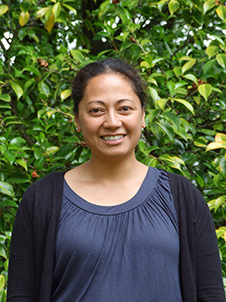
Dr Allamanda Faatoese.
New Zealanders with heart failure are taking part in an international study to find out if a low salt diet will improve their health. With Maori and Pasifika people offering a unique point of difference among the participating countries.
“Maori and Pasifika people are at risk of developing heart failure at a much younger age compared with other ethnic groups such as Europeans or Asians. It can occur any time from in their 20's onwards,” said Dr Allamanda Faatoese of the Christchurch Heart Institute (CHI), a University of Otago Research Centre, who is part of the New Zealand team made up of experts in cardiology from the CHI, as well as Auckland and Middlemore Hospitals.
This has a vast impact on families and whanau when young people of working age become incapacitated or are limited in what they can do.
“The study will find out whether, or not, reducing salt intake, along with usual medical care, lowers the chance of heart failure patients being readmitted to hospital or the Emergency Department, helps patients live longer or improves a patient's quality of life,” Dr Faatoese said.
Heart failure is a condition where the heart is unable to pump enough blood to meet the body's needs typically resulting in water and salt retention. This can cause difficulty breathing and swelling of the legs.
Although there have been many small studies around the world on the effects of salt in heart failure, there is still uncertainty about the optimal salt intake. This current study aims to remedy that, looking at the effects of a low-salt diet compared to usual recommendations for reduction of salt intake in people with heart failure.
Maori cuisine and that of the Pacific Islands is being closely looked at, to consider the differences in these diets and how much salt content is present so that appropriate dietary guidelines incorporate cultural food preferences.
According to Christina McKerchar, nutritionist and lecturer in public health at University of Otago and Maori adviser for the study, developing new eating habits is vital for to help improve quality of life.
“These days, processed foods that are high in salt, are easily accessible. A lot of people don't realise that common foods like bread or crackers are a source of salt, so in this study the focus is to work with people to increase their understanding of food and food labelling so that they can decrease their salt intake”.
People taking part in the SODIUM study are randomly selected to go into either standard care, where they are advised to follow Heart Foundation guidelines for salt intake, or the low sodium diet group which receives specialised salt reduction advice every three months from a dietitian, with phone support in between clinic visits.
So far, the CHI has recruited 16 local people with heart failure, New Zealand aims to contribute 200 to the 1000 participants who will take part in the study from New Zealand, Canada, Mexico, Chile and Argentina.
This is an HRC funded project run by the Christchurch Heart Institute in collaboration with Prof Doughty (Heart Foundation chair of Heart Health, Auckland University) and Dr Mayanna Lund, Cardiologist, Counties Manakau DHB, and Chair of NZ branch of CSANZ. The study is also supported by the Heart Foundation of NZ.
